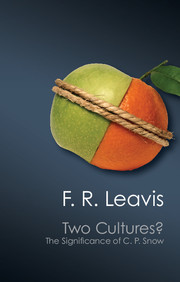Two Cultures? The Significance of C. P. Snow (1962)
Published online by Cambridge University Press: 05 September 2013
Summary
If confidence in oneself as a master-mind, qualified by capacity, insight and knowledge to pronounce authoritatively on the frightening problems of our civilization, is genius, then there can be no doubt about Sir Charles Snow's. He has no hesitations. Of course, anyone who offers to speak with inwardness and authority on both science and literature will be conscious of more than ordinary powers, but one can imagine such consciousness going with a certain modesty – with a strong sense, indeed, of a limited range and a limited warrant. The peculiar quality of Snow's assurance expresses itself in a pervasive tone; a tone of which one can say that, while only genius could justify it, one cannot readily think of genius adopting it. It is the tone we have (in so far as it can be given in an isolated sentence) here:
The only writer of world-class who seems to have had an understanding of the industrial revolution was Ibsen in his old age: and there wasn't much that old man didn't understand.
Clearly, there is still less Sir Charles Snow doesn't understand: he pays the tribute with authority. We take the implication and take it more surely at its full value because it carries the élan, the essential inspiration, of the whole self-assured performance. Yet Snow is in fact portentously ignorant. No doubt he could himself pass with ease the tests he proposes for his literary friends with the intimation that they would fail them, and so expose themselves as deplorably less well educated in respect of science than he, though a scientist, can claim to be in respect of literature. I have no doubt that he can define a machine-tool and state the second law of thermodynamics. It is even possible, I suppose (though I am obliged to say that the evidence seems to me to be against it), that he could make a plausible show of being inward with the Contradiction of Parity, that esoteric upshot of highly subtle experiment which, he suggests, if things were well with our education, would have been a major topic at our High Tables.
- Type
- Chapter
- Information
- Two Cultures?The Significance of C. P. Snow, pp. 53 - 88Publisher: Cambridge University PressPrint publication year: 2013
- 2
- Cited by



